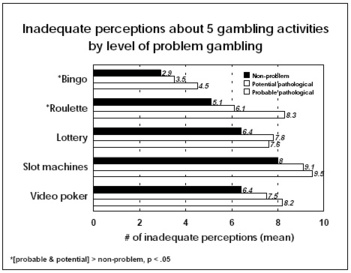Gambling activities involve varying levels of skill. The lottery, for example, is an entirely random event that cannot be influenced by skill. Blackjack, poker, and craps are examples of games that involve skill as well as chance. Two questions researchers have examined are: 1) do individuals have accurate perceptions of the level of skill involved in various gambling games?, and 2) does greater skill (knowledge of probability and expected value) protect a gambler from developing a compulsive gambling problem? A study* of 110 volunteers included 112 survey items about perceptions of randomly determined events. The results showed that potential and probable pathological gamblers scored significantly higher than non-problem gamblers on measures of inadequate perceptions of bingo and roulette (see chart below). Wynne and his colleagues** conducted in-depth interviews with 10 frequent gamblers, 10 problem gamblers, and 10 probable pathological gamblers. The respondents were asked to estimate the payback advantage of their favorite gambling activity (the percentage of each gambling dollar that is returned to the player). Most respondents (70% of frequent gamblers, 70% of the problem gamblers, and 80% of the pathological gamblers) thought less money was returned to the player than was the case. The only respondent who knew the odds of his favorite gambling activity was a probable pathological gambler. Finally, a study*** surveyed 4th, 6th, and 8th grade students about perceived skill involved in gambling activities. Of the 104 students, 56% believed gambling involved a lot of skill, 31% believed gambling involved a little skill, and 13% believed gambling involved no skill. Future research will further decipher the relationships between knowledge of probability, perceived and actual skill involved in gambling activities, and disordered gambling.
Sources: *Ladouceur, R., Arsenault, C., Dubé, D., Freeston, M.H., & Jacques, C. (1997). Psychological characteristics of volunteers in studies on gambling. Journal of Gambling Studies, 13(1), 69-84; **Wynne, H.J., Smith, G.J., & Volberg, R.A. (1994). Gambling and problem gambling in Alberta (Report prepared for Alberta Lotteries and Gaming). Edmonton, Alberta: Author; ***Derevensky, J.L., Gupta, R., & Cioppa, G.D. (1996). A developmental perspective of gambling behavior in children and adolescents. Journal of Gambling Studies, (12)1, 49-66.
This public education project is funded, in part, by The Andrews Foundation.





